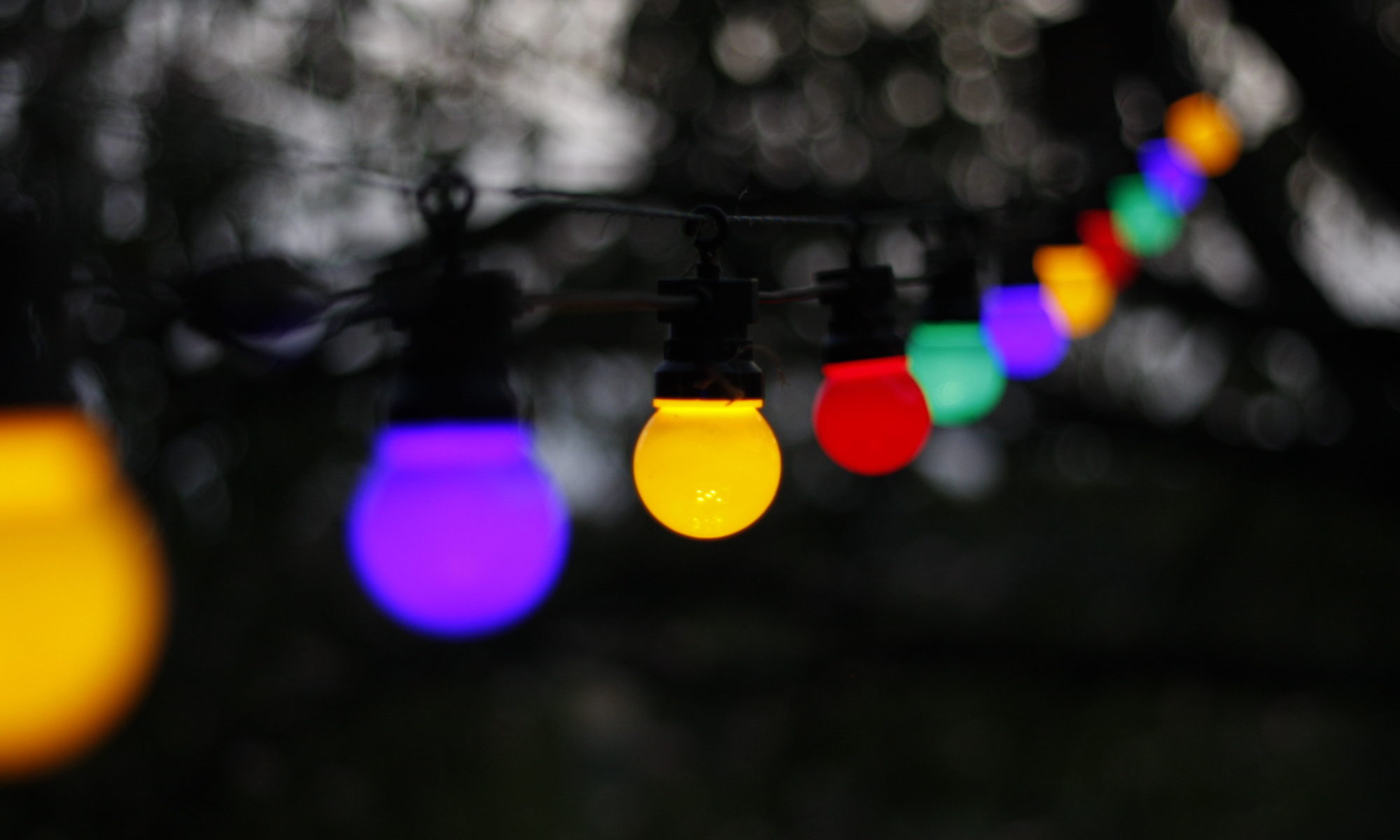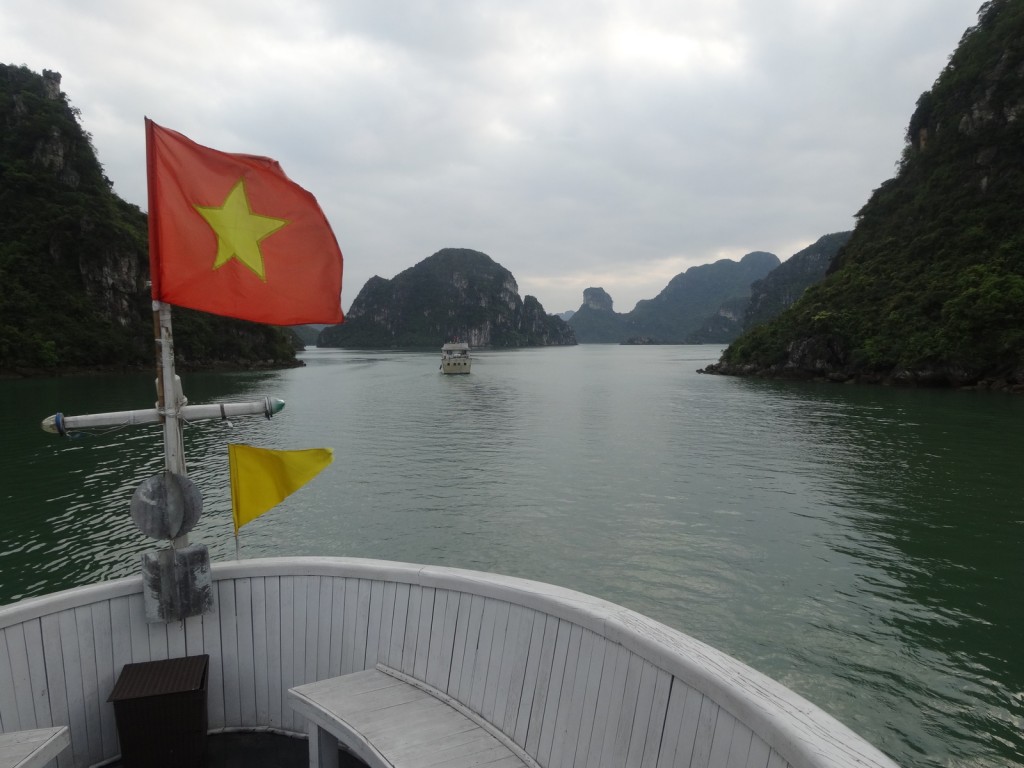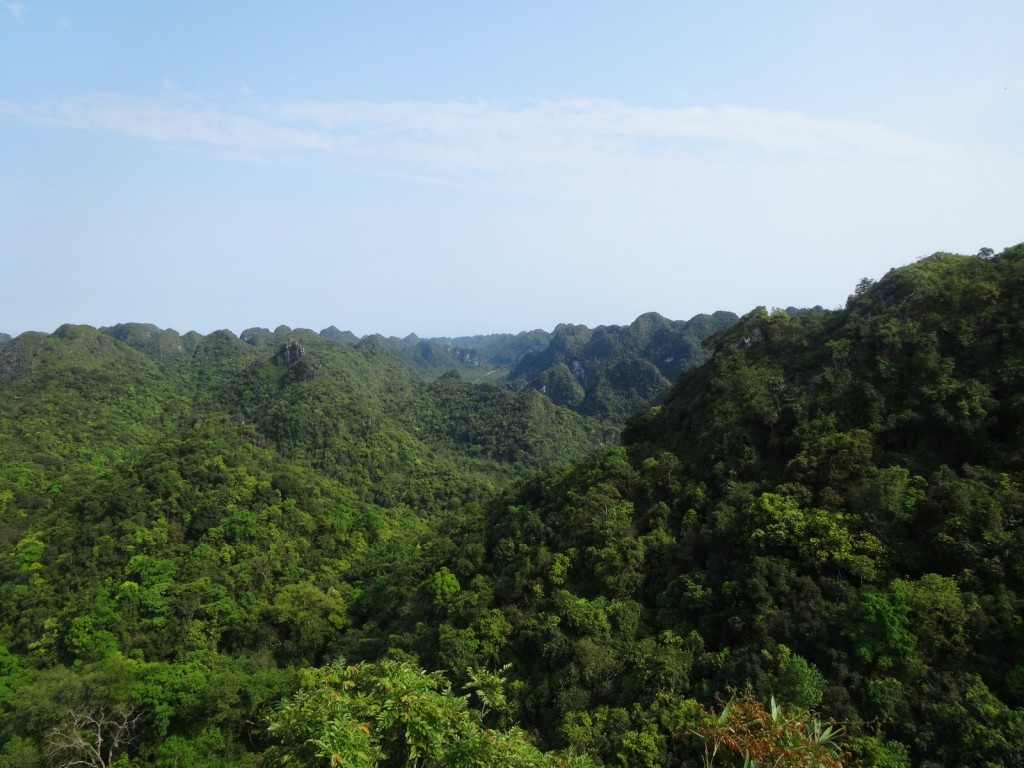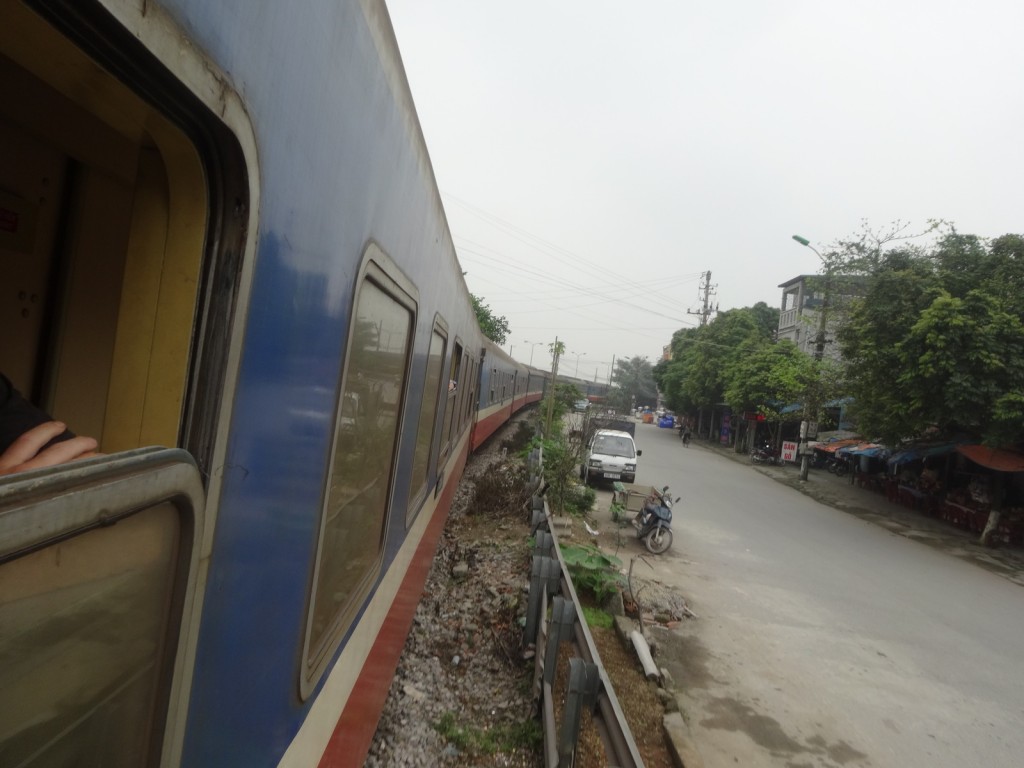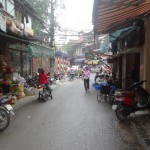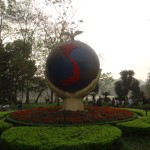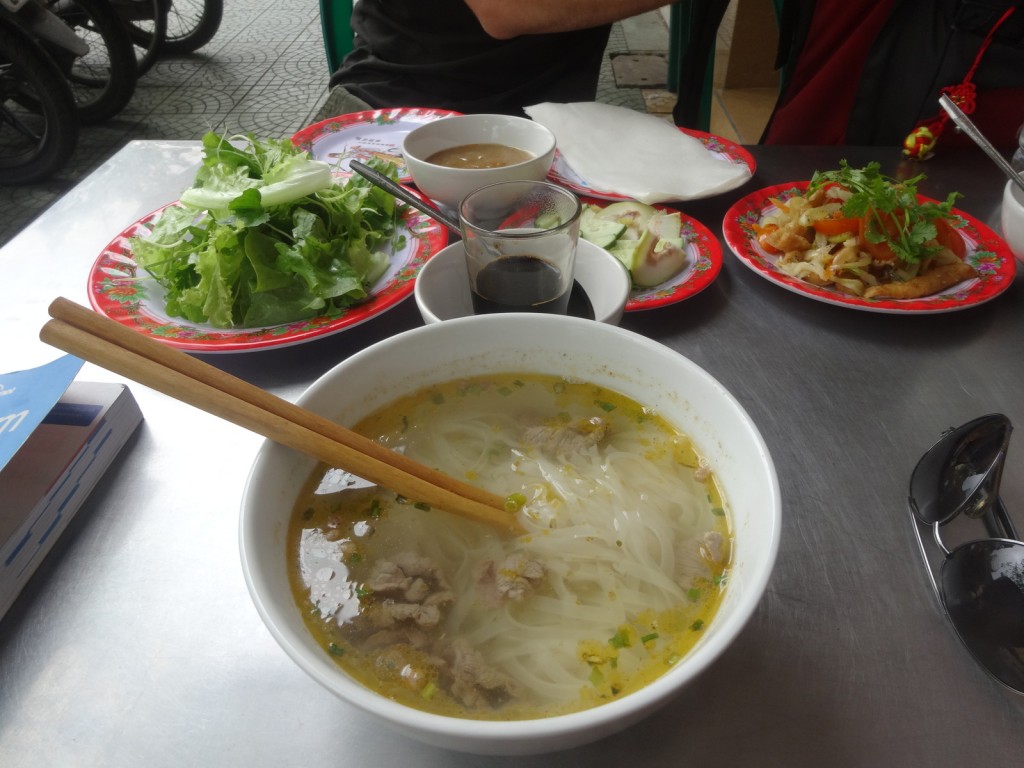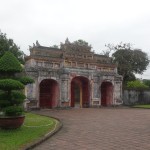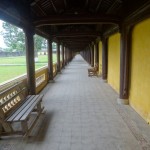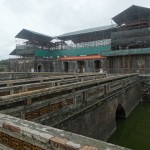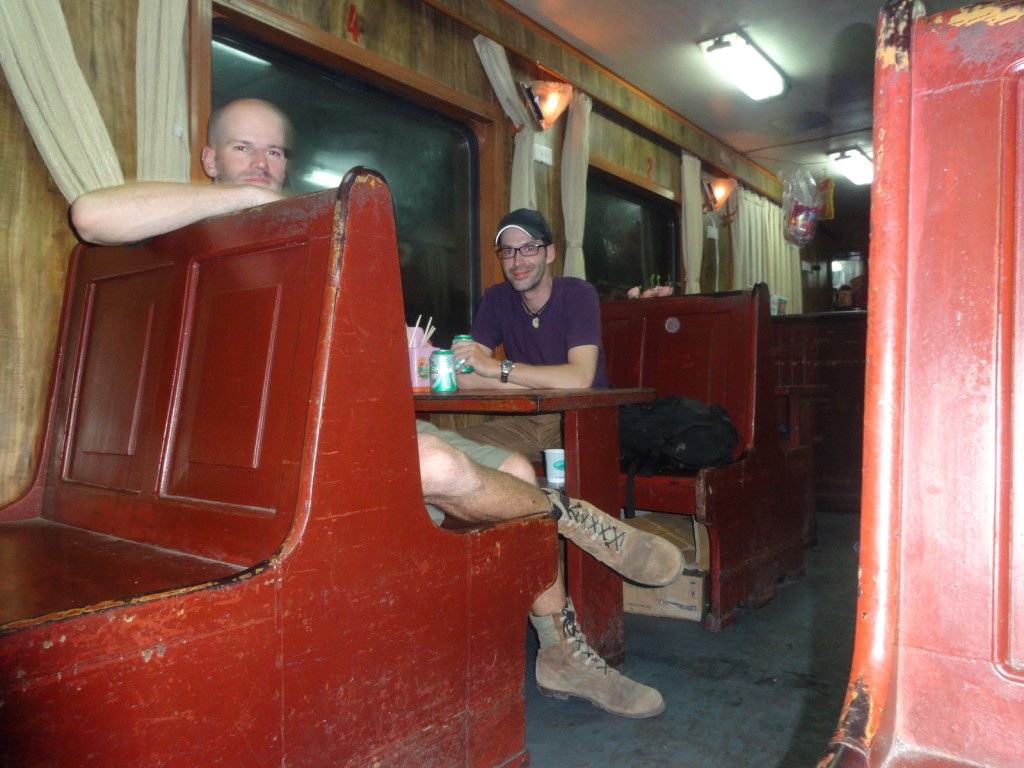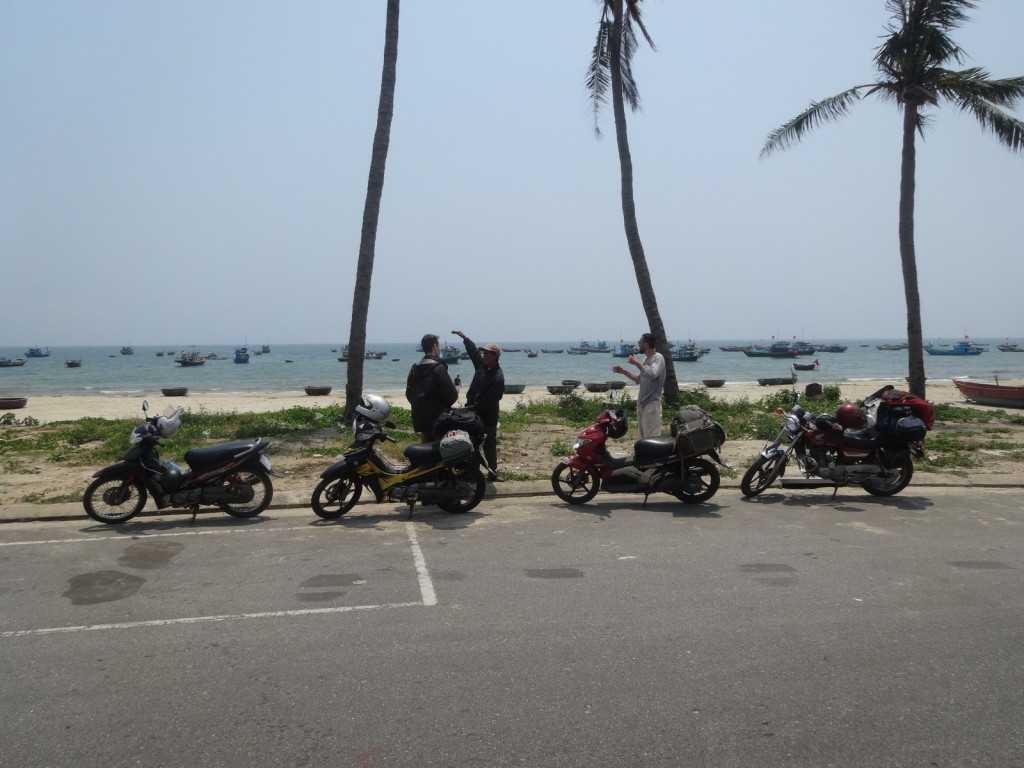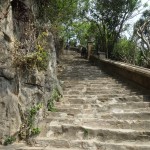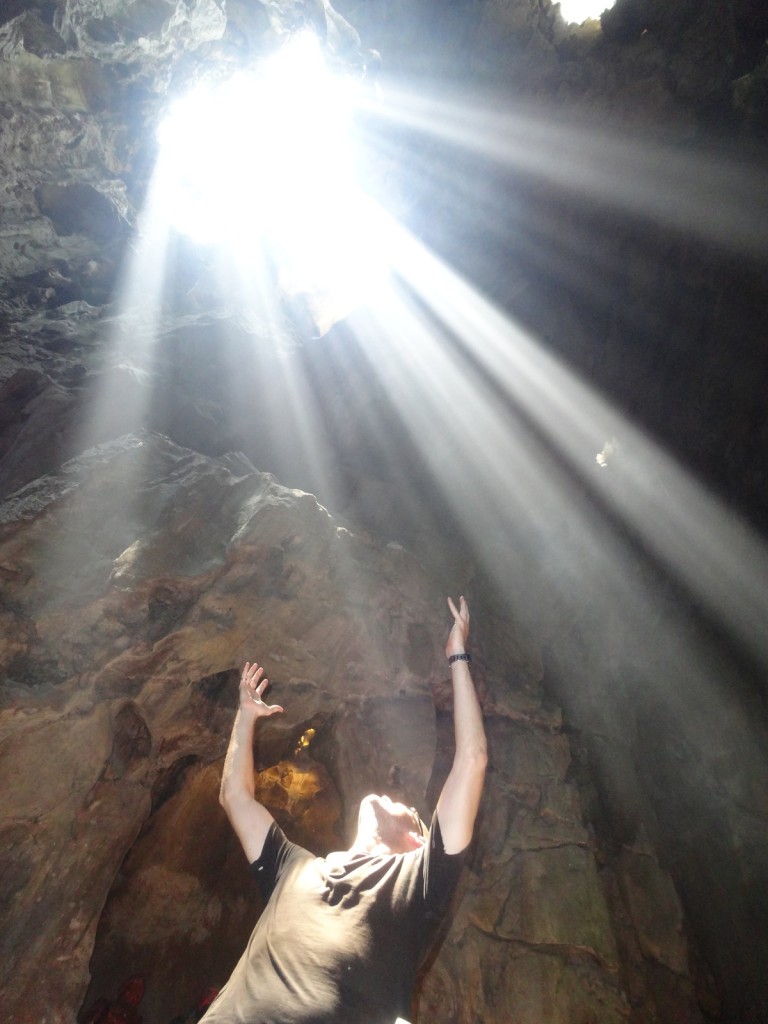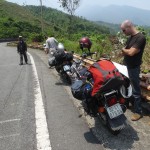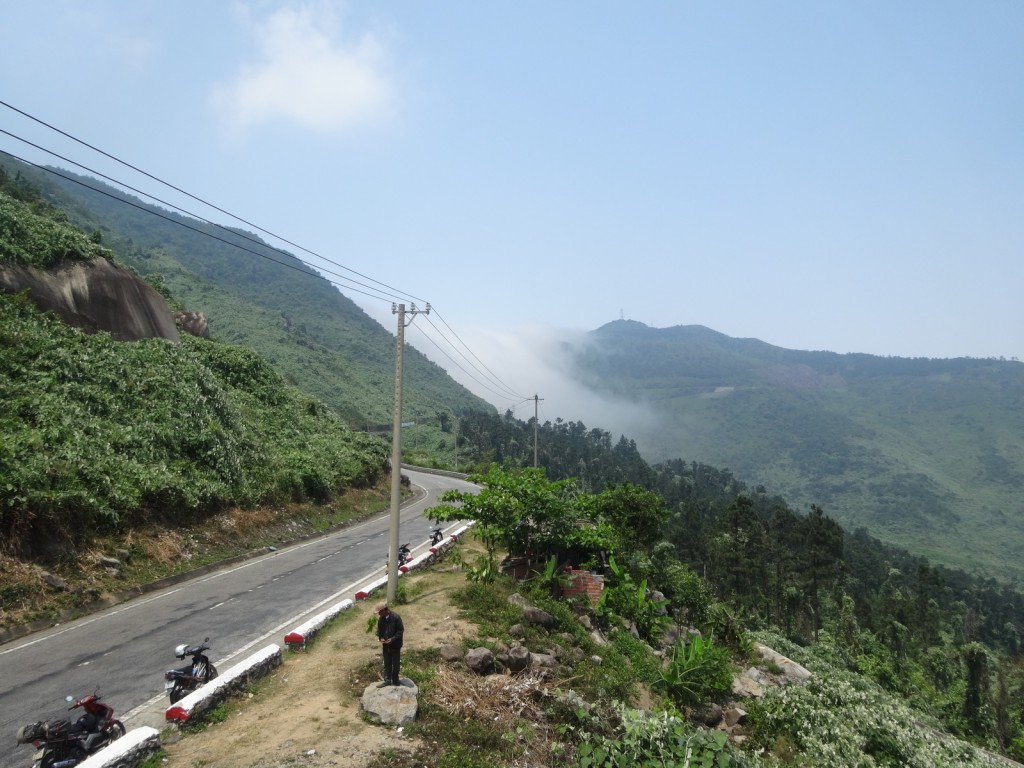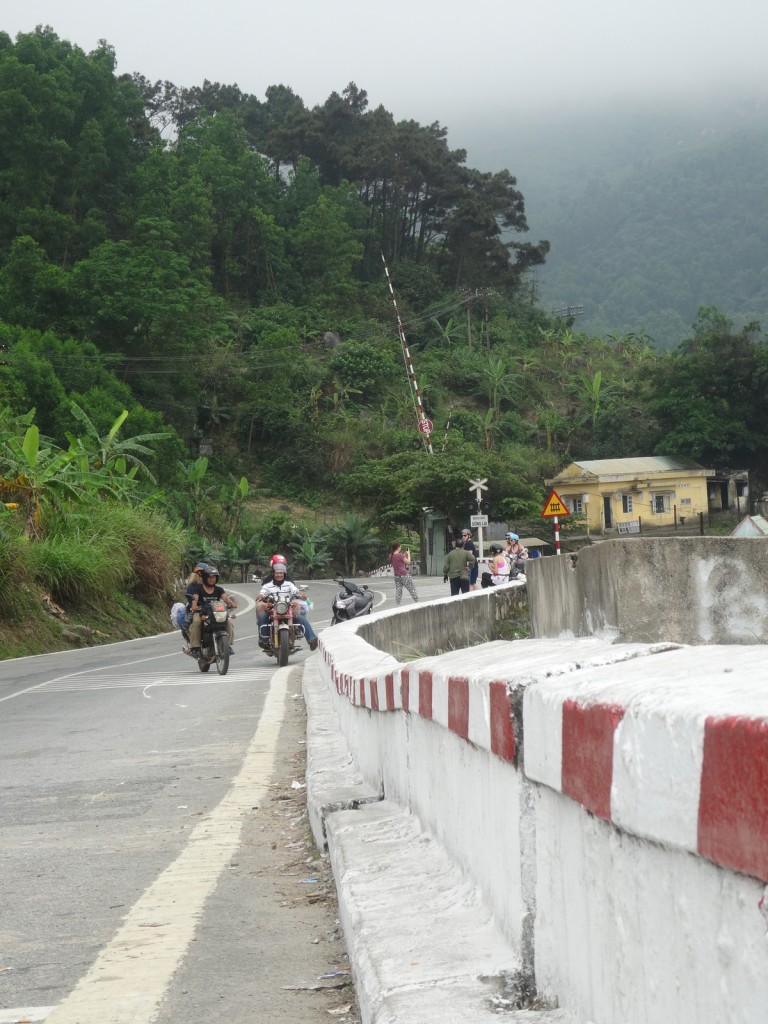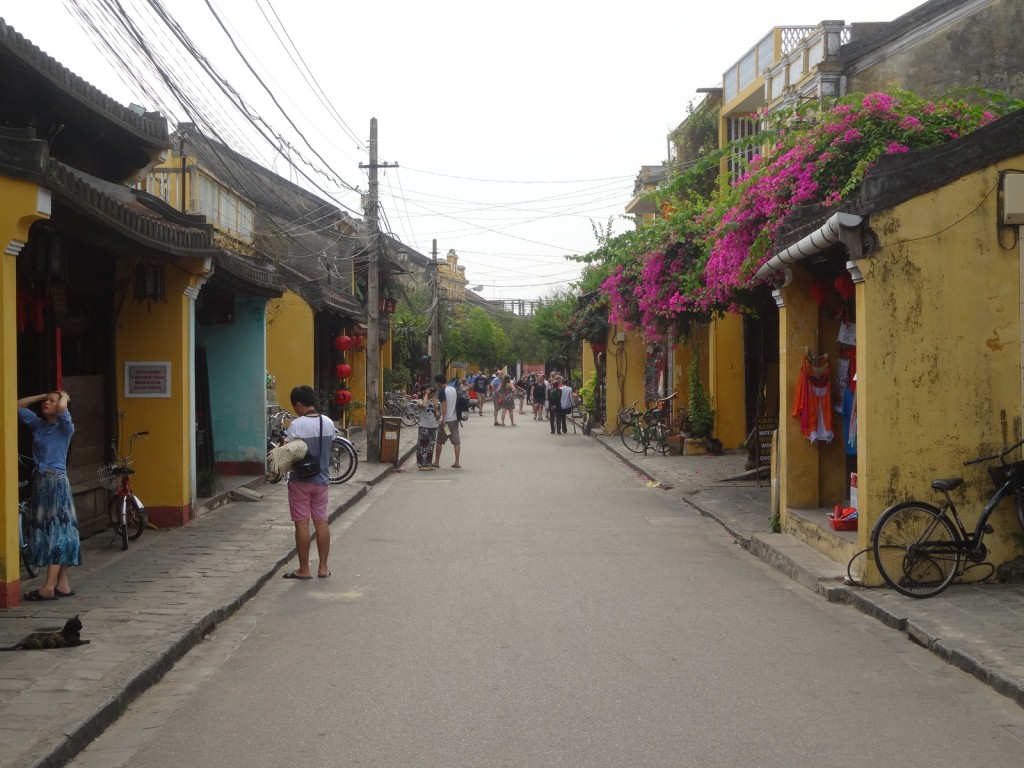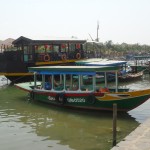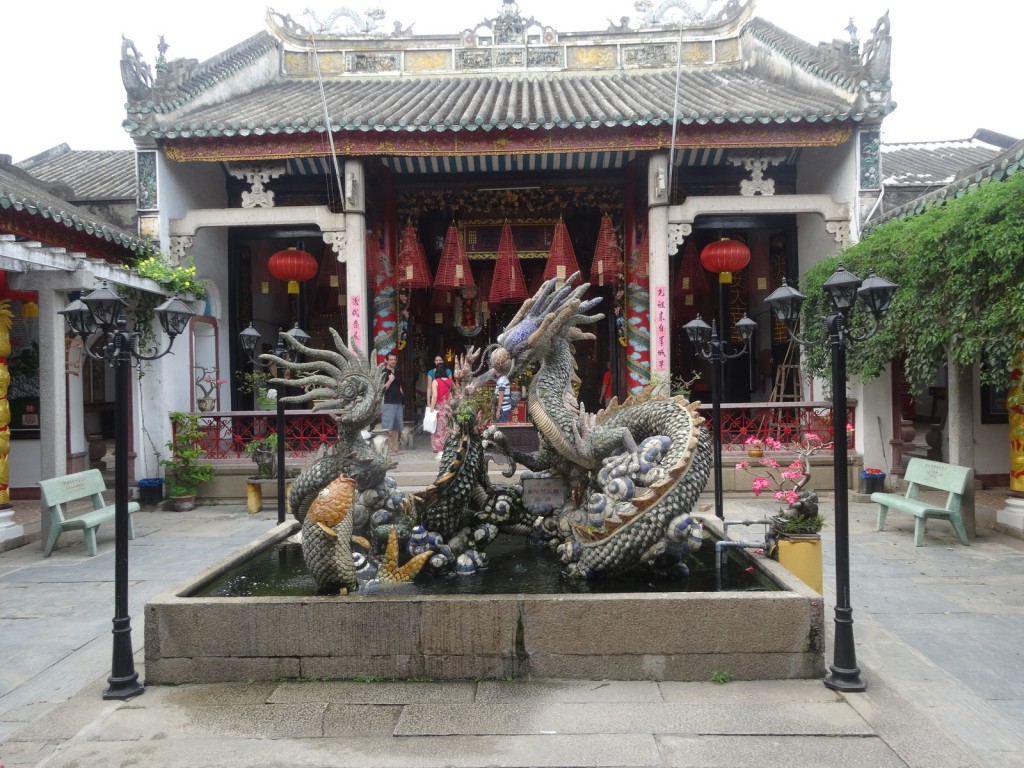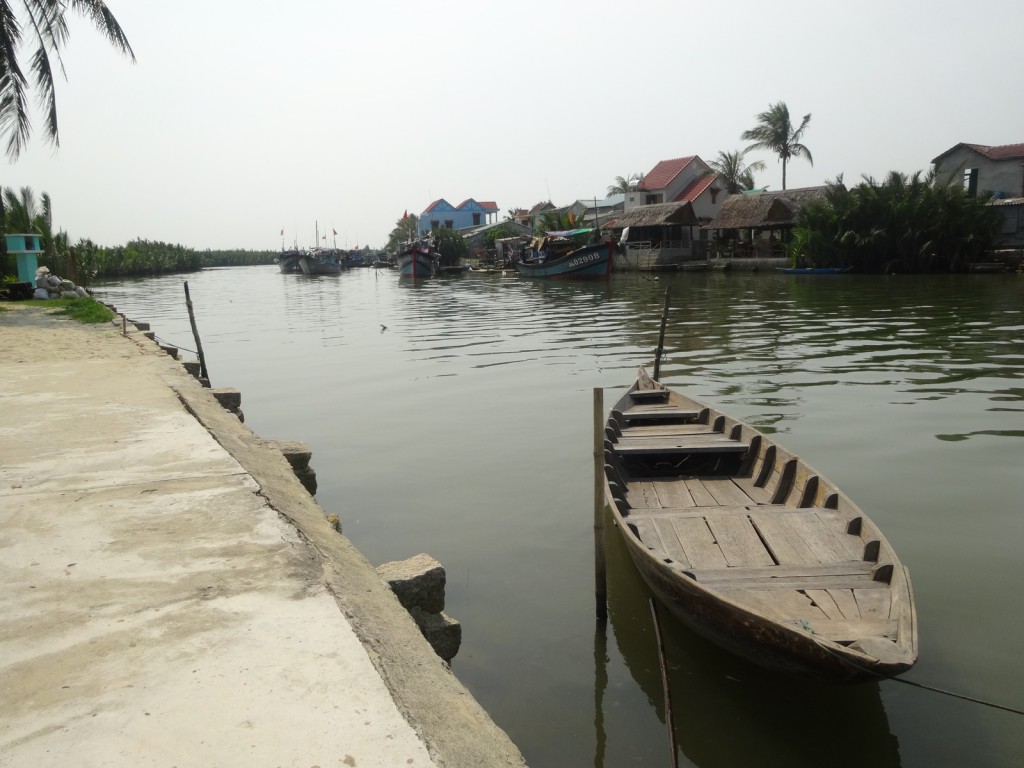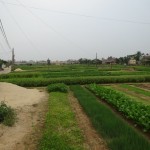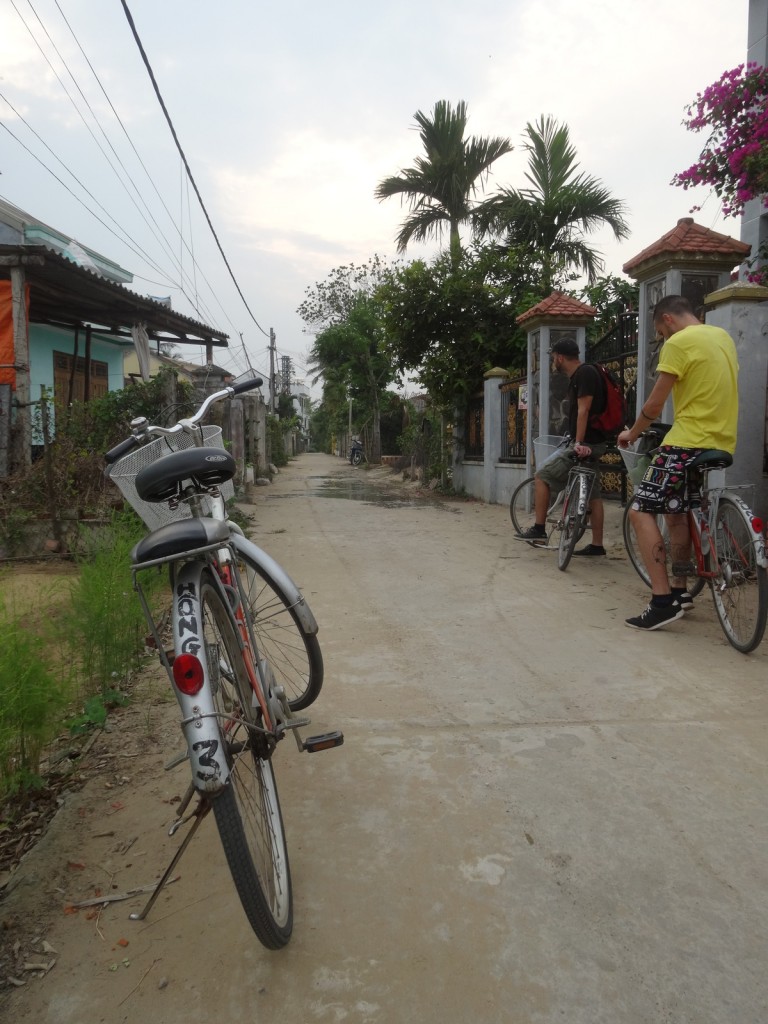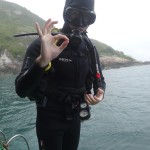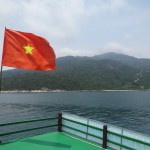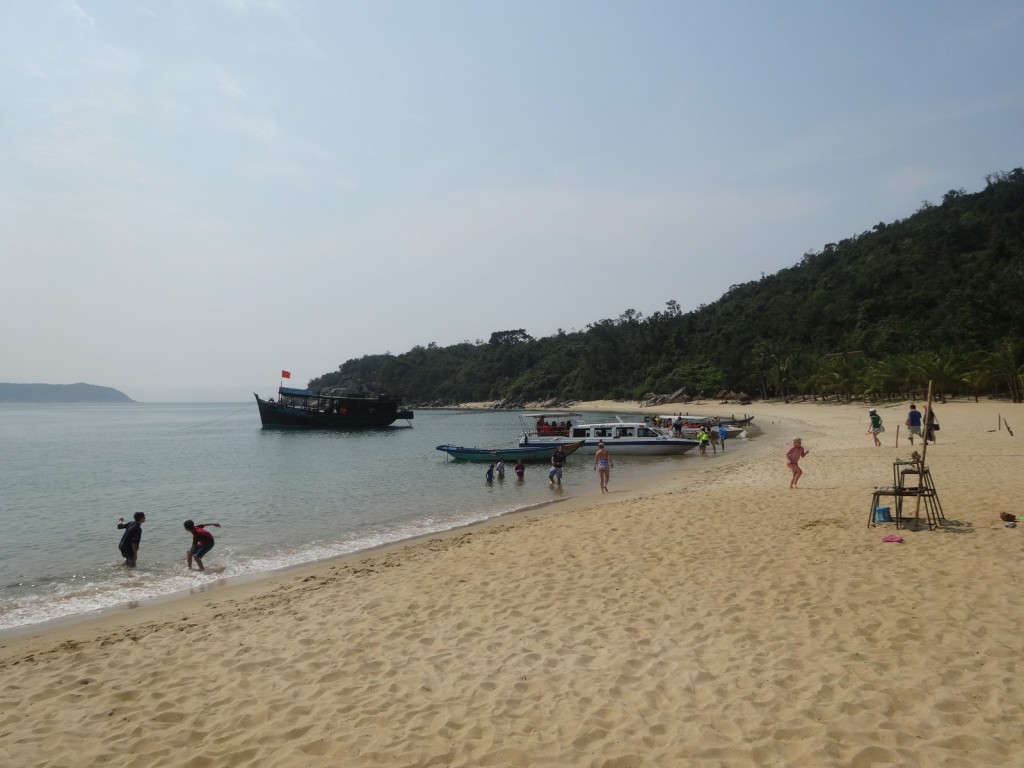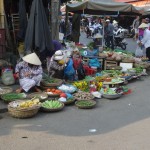Difficile le lever mais bon, nous nous sommes dits que nous pourrions dormir dans le bus. Erreur! La chaussée était bien trop cahoteuse et les banquettes d’un de ces formats qui ne sont confortables dans absolument aucune position. Comme les sièges du Mc Donald’s, mais pour un minibus.
La baie d’Ha Long
À l’arrivée au port, le contenu du bus a été séparé en deux; les couples d’un côté et les voyageurs individuels de l’autre. Une fois à bord du bateau, nous avons été assignés à notre chambre et le navire se mit bientôt en marche vers sa première destination, une grotte. De l’extérieur, ce dernier n’avait pas grand chose d’inspirant, mais l’intérieur était surprenament bien fourni et le repas qui nous a été servi pour le déjeuner étonnament bon. Tout ça pour 70$ par tête avec un équipage de quatre pour deux jours, je commençais à me dire que nous avions fait une bonne affaire. D’autant plus que nous n’étions que sept. Moi, Yves-Étienne, une indienne et quatre allemands.
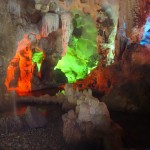 Nous nous y attendions mais la grotte Sung Sok s’avéra être une grosse farce. Autrefois un endroit probablement spectaculaire en raison de sa vastitude, les autorités Vietnamiennes avait cru bon d’y installer des fontaines et des lumières arc-en-ciel. J’aime mes cavernes avec de la fiante de volatile partout, de gros insectes, de la noirceur et des chauves-souris qui me passent au ras du crâne, mais là, ça n’aurait pas pu être plus asseptisé que ça. Au grand bonheur des touristes chinois qui la cartographiaient sous tous ses plus menus angles à coup de flash. Une fois sortis, ils s’en prirent à Dipti, l’indienne et moi de rire de sa popularité impromptue, c’est ensuite vers ma personne qu’ils se tournèrent pour une séance photo. Les vendeuses de bricoles Vietnamiennes elles, ne sont pas racistes et nous donnèrent donc tous de l’attention: You buy something? Vu le nombre de bateaux à l’extérieur du site, la visite n’aurait pas pu être autre. Je ne sais pas quel est le débit précis de visiteurs dans cette grotte, mais ce dont je suis certain, c’est qu’il est largement trop élevé pour permettre à la vie caverneuse se subsister.
Nous nous y attendions mais la grotte Sung Sok s’avéra être une grosse farce. Autrefois un endroit probablement spectaculaire en raison de sa vastitude, les autorités Vietnamiennes avait cru bon d’y installer des fontaines et des lumières arc-en-ciel. J’aime mes cavernes avec de la fiante de volatile partout, de gros insectes, de la noirceur et des chauves-souris qui me passent au ras du crâne, mais là, ça n’aurait pas pu être plus asseptisé que ça. Au grand bonheur des touristes chinois qui la cartographiaient sous tous ses plus menus angles à coup de flash. Une fois sortis, ils s’en prirent à Dipti, l’indienne et moi de rire de sa popularité impromptue, c’est ensuite vers ma personne qu’ils se tournèrent pour une séance photo. Les vendeuses de bricoles Vietnamiennes elles, ne sont pas racistes et nous donnèrent donc tous de l’attention: You buy something? Vu le nombre de bateaux à l’extérieur du site, la visite n’aurait pas pu être autre. Je ne sais pas quel est le débit précis de visiteurs dans cette grotte, mais ce dont je suis certain, c’est qu’il est largement trop élevé pour permettre à la vie caverneuse se subsister.
De retour à bord du bateau pour une heure pour un autre arrêt, cette fois à un village flottant de pêcheurs. Encore la même histoire sauf que là, on se fait filer des kayaks et l’on se promène parmis les formations rocheuses. Il faut le dire, la baie d’Ha Long est un endroit spectaculaire. D’autant plus que pour nous, les conditions n’étaient pas idéales, car encore trop tôt dans la saison, le ciel était nuageux et la visibilité limités à quelques kilomètres. Ceci dit, comment les villageois devaient se sentir de voir défiler des centaines de touristes chaque jour dans leur cour arrière? Choyés selon notre guide, car apparament, une partie des revenus leur est redistribuée. Alors pourquoi des enfants à bord de barques défraîchies étaient venus à l’abordage de nos kayaks pour nous soutirer des sous ou nous vendre des bananes (des bananes en pleine mer…)? Redistribution des richesses version communiste voilà…
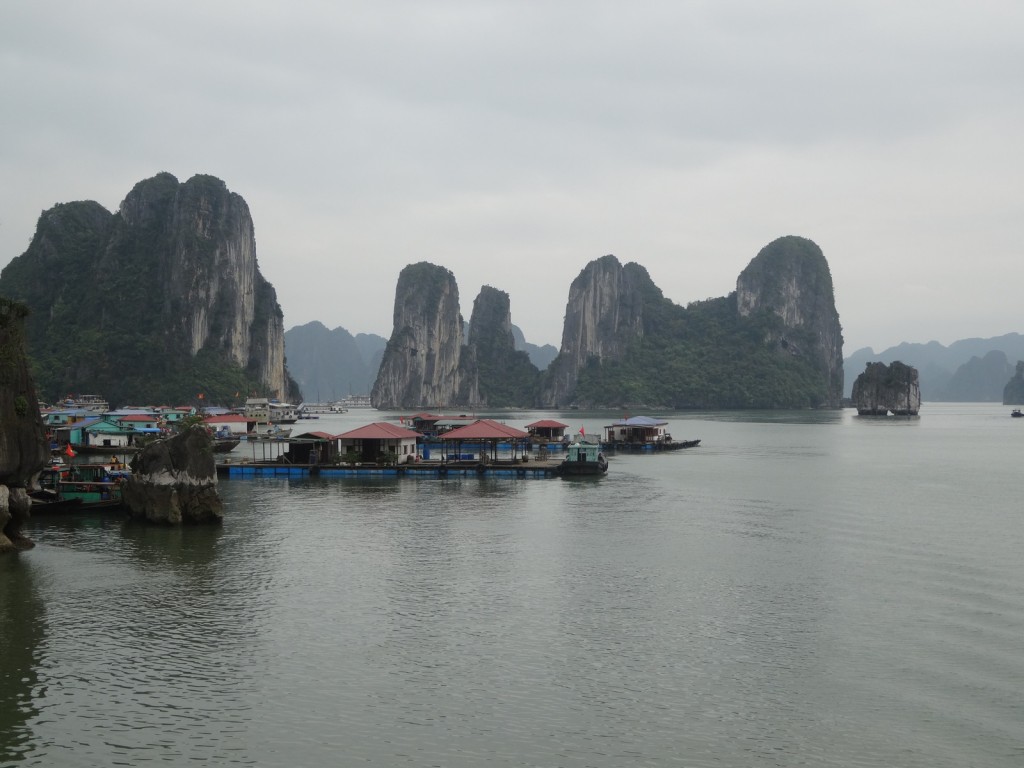
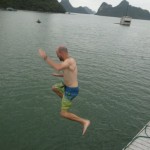 Finamelement, la prochaine halte allait être la dernière de la journée. Là, nous pouvions nous baigner selon notre guide. L’eau était froide, mais ce n’était pas ça qui allait nous arrêter. La pollution par contre nous fit réfléchir deux fois avant de sauter, mais Yves-Éteinne et moi, fières représentants de la nation nordique du Canada (pour le meilleur et pour le pire), avons tout même décidé de faire fi des sacs plastiques flottants dans les parrages et de nous mouiller dans la fameuse baie d’Ha Long. Un saut de l’arrière du bateau, pas si mal finalement. Contre les indications de l’équipage, nous nous sommes rendus jusqu’au pont supérieur pour plonger au grand amusement de nos compagnons de croisières qui reçurent tous par la suite la mention de “mauviettes allemandes” de notre part une fois secs et de retour parmis eux. L’indienne, venant d’un pays chaud, fut excusée.
Finamelement, la prochaine halte allait être la dernière de la journée. Là, nous pouvions nous baigner selon notre guide. L’eau était froide, mais ce n’était pas ça qui allait nous arrêter. La pollution par contre nous fit réfléchir deux fois avant de sauter, mais Yves-Éteinne et moi, fières représentants de la nation nordique du Canada (pour le meilleur et pour le pire), avons tout même décidé de faire fi des sacs plastiques flottants dans les parrages et de nous mouiller dans la fameuse baie d’Ha Long. Un saut de l’arrière du bateau, pas si mal finalement. Contre les indications de l’équipage, nous nous sommes rendus jusqu’au pont supérieur pour plonger au grand amusement de nos compagnons de croisières qui reçurent tous par la suite la mention de “mauviettes allemandes” de notre part une fois secs et de retour parmis eux. L’indienne, venant d’un pays chaud, fut excusée.
La soirée a commencé avec un autre très bon repas et s’est poursuivie sur le pont supérieur à discuter de diverses choses. Sur l’autre bateau, on apercevait la boule disco qui tournait et le bruit émanant de celui-ci laissait supposer de la grosse débauche. Je n’aurais pas été contre un peu plus d’action, mais de boire une bière tranquille parmis les silhouettes des pics rocheux de la baie se dessinant sur le ciel étoilé, je n’étais pas contre non-plus. Au programme du lendemain, nous devions aller visiter une autre grotte sur l’île de Cat Ba, ce que nous avons fait, mais au lieu de retourner à bord du navire et de revenir au port, nous sommes resté pour l’explorer un peu plus en profondeur.
L’île de Cat Ba
Notre permière visite sur l’île a été “Hospital Cave” qui comme son nom l’indique, fut à un moment dans son histoire un hôpital. Aussi un bunker et un post de commandement. Là, nous avons été un peu plus satisfait, car il semblait que la grotte avait été très peu modifiée et au petit café en face, le gardien a été fort sociable et aimable. L’autobus nous a ensuite ammené jusqu’à Cat Ba town, de l’autre côté de l’île, ce qui sonnait aussi la fin de la partie organisée de notre séjour dans la baie d’Ha Long. Les Allemands eux, continuaient pour une journée encore sur l’île des singes, mais la perspective d’aller voir des primates en semi-captivité ne nous inspirait pas trop Yves-Étienne et moi alors c’est pourquoi nous avons préféré continuer par nos propres moyens.
Donc vite nous avons trouvé notre auberge et vite nous avons gagné notre chambre pour y faire une sieste, ou plutôt une partie de nuit, car après trois-heures de sommeil, voyant que mon compagnon ne se réveillait pas, j’ai été forcé de le secouer un peu: nous avions planifié d’aller nous ballader dans le parc national de l’île. Une fois la moto louée et un petit arrêt à un resto, nous étions en route vers le parc. L’île de Cat Ba est un endroit magnifique. Faisant partie de la baie d’Ha Long, elle est évidemment le fruit du même processus géologique sauf que là, tout se trouve au dessus de l’eau. D’ailleurs, nous avons pu en observer l’étendu du haut d’un de ce pic que nous avons gravi lors de notre petite session de hiking. Le préposé à l’entrée du parc nous avait recommandé un bon deux heures pour faire l’aller retour, mais en un peu mois d’une heure, nous avions non-seulement monté la montagne, mais aussi exploré tous le réseau de sentiers immédiat.
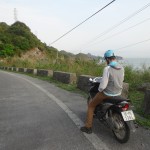 Ayant encore quelques heures de clarté, nous sommes ensuite allé explorer l’île à moto. Même décor spectaculaire. Sur un pan de route droit, j’ai laissé Yves-Étienne conduire avec moi comme passager, car il était curieux de voir comment la machine se comportait avec 80 kilos sur le siège arrière. De retour à Cat Ba town, il nous restait encore un peu de temps alors nous sommes montés jusqu’au fort, autrefois construit par les Français pour défendre l’île. Là par contre, nous avons surestimé un peu la lumière qu’il nous restait pour la visite et l’avons complété de nuit. Tout avait été fermé, mais en revanche, nous avions le fort pour nous-mêmes. Une pizza trop liquide pour souper et encore fatigués des dernier jours, nous avons passé le reste de la soirée à regarder la télévision. J’ai tenté d’ouvrir mon ordinateur pour travailler un peu, mais la lâcheté a eu le meilleur de ma personne alors j’ai remis tout ça au lendemain et me suis laissé lobotomisé par le petit écran. Je ne regarde la télévision qu’à peu près tous les 3 mois et l’on dirait qu’à chaque fois, la qualité de la programmation empire un peu plus.
Ayant encore quelques heures de clarté, nous sommes ensuite allé explorer l’île à moto. Même décor spectaculaire. Sur un pan de route droit, j’ai laissé Yves-Étienne conduire avec moi comme passager, car il était curieux de voir comment la machine se comportait avec 80 kilos sur le siège arrière. De retour à Cat Ba town, il nous restait encore un peu de temps alors nous sommes montés jusqu’au fort, autrefois construit par les Français pour défendre l’île. Là par contre, nous avons surestimé un peu la lumière qu’il nous restait pour la visite et l’avons complété de nuit. Tout avait été fermé, mais en revanche, nous avions le fort pour nous-mêmes. Une pizza trop liquide pour souper et encore fatigués des dernier jours, nous avons passé le reste de la soirée à regarder la télévision. J’ai tenté d’ouvrir mon ordinateur pour travailler un peu, mais la lâcheté a eu le meilleur de ma personne alors j’ai remis tout ça au lendemain et me suis laissé lobotomisé par le petit écran. Je ne regarde la télévision qu’à peu près tous les 3 mois et l’on dirait qu’à chaque fois, la qualité de la programmation empire un peu plus.
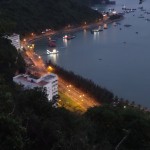
Une grosse nuit derrière nous donc, nous nous sommes levés plutôt de bonne heure et après un déjeuner de pain, saucisse et oeufs, je me suis attablé à mon ordinateur pendant qu’Yves-Étienne est parti se promener à moto tout seul. En récupérant mes e-mails, j’ai reçu la nouvelle comme quoi j’étais convoqué aux entrevues de médecine pour l’Université de Montréal. Toute une suprise! En décembre dernier lorsque j’étais au Japon, j’avais appliqué aux trois grandes universités québécoises pour rentrer dans leur programme de doctorat en médecine et durant les derniers jours, deux d’entres elles m’avaient répondus négativement en raison de mes notes. Chose à quoi je m’attendais.
Les principes guident une bonne partie de ma vie, notamment celui de la parole. Avant de partir en voyage, j’avais formulé l’idée de devenir docteur, pensant que ce pourrait être le genre de défi et de vocation que je recherchais, mais en raison de la sélection très stricte, je n’y croyais pas vraiment, pensant que mon cheminement de vie ayant été un peu trop hétéroclite pour faire de moi un candidat viable. Cependant, comme j’avais dit que j’essaierai, par principe j’ai effectivement postulé. Je ne cacherai pas que le retour négatif de deux universités a effleuré mon ego et je m’attendais à ce que la réponse de la troisième se situe dans les mêmes lignes, mais lorsque j’ai vu le e-mail, je n’en croyais pas mes yeux.
Ce fut un sentiement plutôt difficile à contenir. Yves-Étienne est revenu très vite de sa balade en raison d’une avarie et a dû me sentir très fébrile lorsque je lui ai résumé la situation. La meilleure manière dont j’ai pu lui décrire mes émotions a été en comparant ce e-mail à la lotterie. À mois d’avoir un sérieux problème de jeux compulsif, lorsqu’on joue à la grosse lotterie, on ne s’attend jamais vraiment à gagner. Tout de même, l’imagination s’emballe et fabule sur une vie désormais dénuée de souçis financiers, mais notre être rationel sait très bien que le tout ne restera dans le domaine du rêve. Lorsque la chose se matérialise par contre, on ne sait quoi penser. Tous les plans que nous avions sont à revoir et seront changés. Toutes une foules de nouvelles variables de vie à prendre en compte. Mais le cerveau humain a de cette atout fondamental qu’il s’adapte et la seconde où le mien a pris connaissance de la nouvelle, il s’est remis aux planches à dessin. Il allait donc falloir que je retourne au Canada. Mon voyage s’arrêterai donc au Vietnam. Flatté de cette nouvelle, je me sentais toutefois deçu de ne pas pouvoir compléter mon périple. Mais bon, ne nous emportons pas, la partie n’est pas gagné et si je suis tout de même refusé, le Laos et le Cambodge seront encore là pour m’accueilllir. Sans oublier le fait que je me commençais à me sentir mature pour une autre pause.
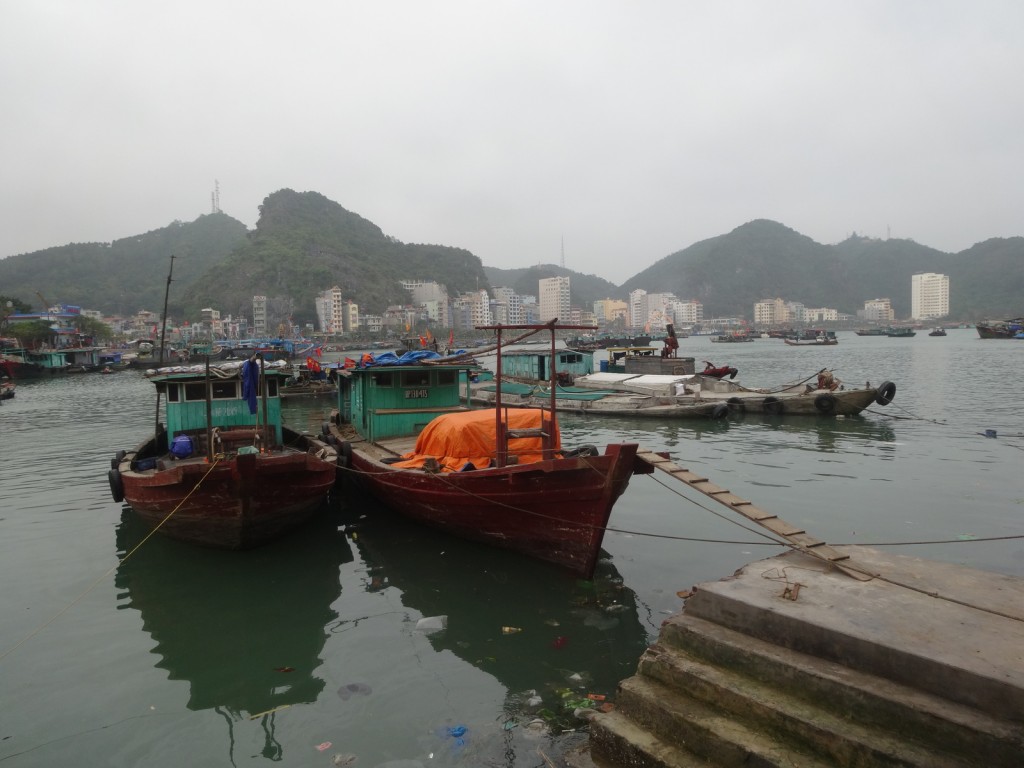
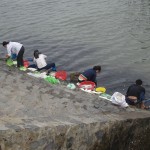
Dans l’après-midi, nous sommes retournés au parc pour visiter une grotte avoisinante et de retour en ville, nous nous sommes dirigés vers le port de pêcheurs. Rien de grandiose ne s’est passé et nous n’avons fait que discuter. J’en vait bien besoin semblait-il. Après une bière dans le coin et un repas non-loin de l’auberge, nous sommes sortis au bar d’occidentaux de Cat Ba town. Il y avait une bonne ambiance, des ballons de gaz hilarant et des gens intéressants avec qui discuter. Tard nous nous sommes couchés, mais de toute manière, la journée du lendemain nous retournions à Ha Noi et allions pouvoir somnoler un peu dans les transports.
Moi, j’avais encore le cerveau qui fonctionnait à cent-milles à l’heure.
Photos: Yves-Étienne Landry
